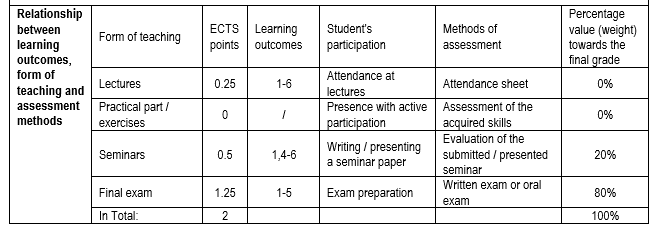To familiarize students with basic principles of general and special pathophysiology. To show students principals and causes of pathophysiological processes. To familiarize students with general and specific behaviour models of the organism in health and sickness.
General pathophysiology:
General models of organism behaviour in health and sickness
General principals of organism response on injury and infection, whether chemical or biological agents.
Special pathophysiology:
Specific behaviour models of the organs and tissue such as: peripheral and central nervous system, cardiovascular system, urogenital organs, hematopoietic organs and blood, respiratory system, digestive organs, endocrine system, tumours, and especially differential diagnosis.
Obavezna literatura:
1. Gamulin S.: Patofiziologija za visoke medicinske škole, Školska knjiga, Zagreb 2005.
Dopunska literatura:
- Isselbacher KJ, Braunwald E, Wilson JD, Martin JB, Fauci AS, Kasper DL. Harrison's Principles of Internal Medicine. 13. izd. New York: McGraw-Hill Medical; 1995.
- Harrison TR, Fauci AS, Longo D, Hauser S, Larry Jameson J. Harrison's Principles of Internal Medicine. 16. izd. New York: McGraw-Hill, Medical Pub. Division; 2005
- Kovač Z, Gamulin S, Marušić M. Patofiziologija. Zagreb: Školska knjiga; 2006.
Upon completion of this course, students will be able to:
1. critically assess the cause-effect relationships of pathophysiological processes that lead to the development of the disease;
2. compare different etiological factors of homeostasis disorders in the body and disease development;
3. rank the main pathophysiological processes at the level of the cell, organ and organ system;
4. predict the symptoms and signs of the disease with the with regard to the pathophysiological principles of the disease;
5. assess the correlation and impact of pathophysiological events in one organ on other organs and the organism as a whole;
6. self-evaluate the recognition of basic diseases based on acquired theoretical knowledge.



